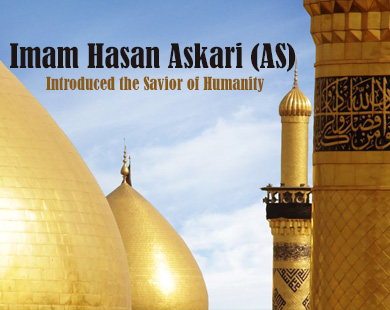The infallible imams of the Ahl-ul-Bayt (a.s) paid too much attention to the interpretation (tafseer) of the Holy Qur'an. Each one of the holy Imam had a school of tafseer, and definitely they were the most aware of the contents of the Qur'an and all its sciences. The master of the pure progeny Imam Ali (a.s) was, among all the Prophet’s companions, the most aware of the facts and minute details of the Qur’an, its muhkam (clear) verses and mutashabih (ambiguous) verses, and he knew when and where each verse was revealed.
As for Imam Abu Muhammad al-Hasan al-Askari (a.s), he was one of the masters of interpreters. A special tafseer known as “tafseer Imam al-Askari” was transmitted from him. Here we mention in brief some holy verses that the imam had interpreted:
1. Abu Hashim al-Ja’fari said, ‘Once, I was with Abu Muhammad (a.s) and asked him about this saying of Allah: (Then We gave the Book for an inheritance to those whom We choose from among Our servants; but of them is he who wrongs himself, and of them is he who takes a middle course, and of them is he who is foremost in deeds of goodness by Allah's permission) (Qur'an, 35:32).
He said, ‘This saying has been revealed about the progeny of Muhammad (a.s). One, who wrongs himself, is the one who does not acknowledge the imam, and one who takes a middle course is the one who acknowledges the imam, and one who is foremost in deeds of goodness by Allah’s permission is the imam.’
My eyes shed tears and I thought with myself of what Allah had given to the progeny of Muhammad (a.s). The imam looked at me and said, ‘How great is that which yourself told you about the great importance of the progeny of Muhammad! Thank Allah for He has made you love them! You shall be called with them on the Day of Resurrection when every human being shall be called with his imam. Be delighted Abu Hashim! You are in good.’
2. Muhammad bin Salih al-Armani asked Imam Abu Muhammad (a.s) about this verse (Allah effaces and establishes what He pleases, and with Him is the basis of the Book) (Qur'an, 13:39). and he replied, ‘Does Allah efface but what has been established, and does He establish but what has been not existent?...The Almighty is far above all things. He is Aware of all things before their existence, the Creator when there was no creation, the Reckoner.’ Muhammad bin Salih said to the imam, ‘I bear witness that you are the authority of Allah and His guardian, and you are on the true path of Imam, Amir al-Muminin.’
3. Muhammad bin Salih al-Armani asked Imam Abu Muhammad (a.s) about this saying of Allah (Allah's is the command before and after) (Qur'an, 30:4) and the imam said, ‘The command is His before He issues it, and the command is His after He commands as He wills.’ I said to myself, ‘this is the saying of Allah (Surely His is the creation and the command; blessed is Allah, the Lord of the worlds (Qur'an, 7:54). The imam looked at me, smiled, and then said, ‘(His is the creation and the command; blessed is Allah, the Lord of the worlds).’
4. Abu Hashim said, ‘I was with Abu Muhammad (a.s) when ibn Salih al-Armani asked him about this verse, (And when your Lord brought forth from the children of Adam, from their backs, their descendants, and made them bear witness against their own souls: Am I not your Lord? They said: Yes, we bear witness) (Qur'an, 7:172).Abu Muhammad (a.s) said, ‘The knowing was proved and they forgot that situation, but they will remember it, and without that no one would know who his creator and provider is.’
I was astonished with myself at the great favors Allah had endowed His guardian (Imam Abu Muhammad) with and the great task He had entrusted him with. Abu Muhammad turned to me and said, ‘O Abu Hashim, the matter is greater and more astonishing than what you have been astonished at. What you think about some people whom whoever acknowledges, acknowledges Allah, and whoever denies, denies Allah? There is no believer that does not believe in them and is not certain in knowing them.’
5. Sufyan bin Muhammad as-Sayfi said, ‘I wrote to Abu Muhammad (a.s) asking him about the “waleejah: friend or protector” mentioned in this saying of Allah, (and take none for friends and protectors except Allah, His Messenger, and the believers) (Qur’an, 9:16). I said with myself: ‘Who does he think the “believers” are here?’
His reply came to me saying, ‘The “waleejah” is that which is set for the “guardian”. You talked to youself that who were meant by the “believers” in this verse. They are the Imams who believe in Allah, and namely we are those “believers”.’
* Source: duas.org


















